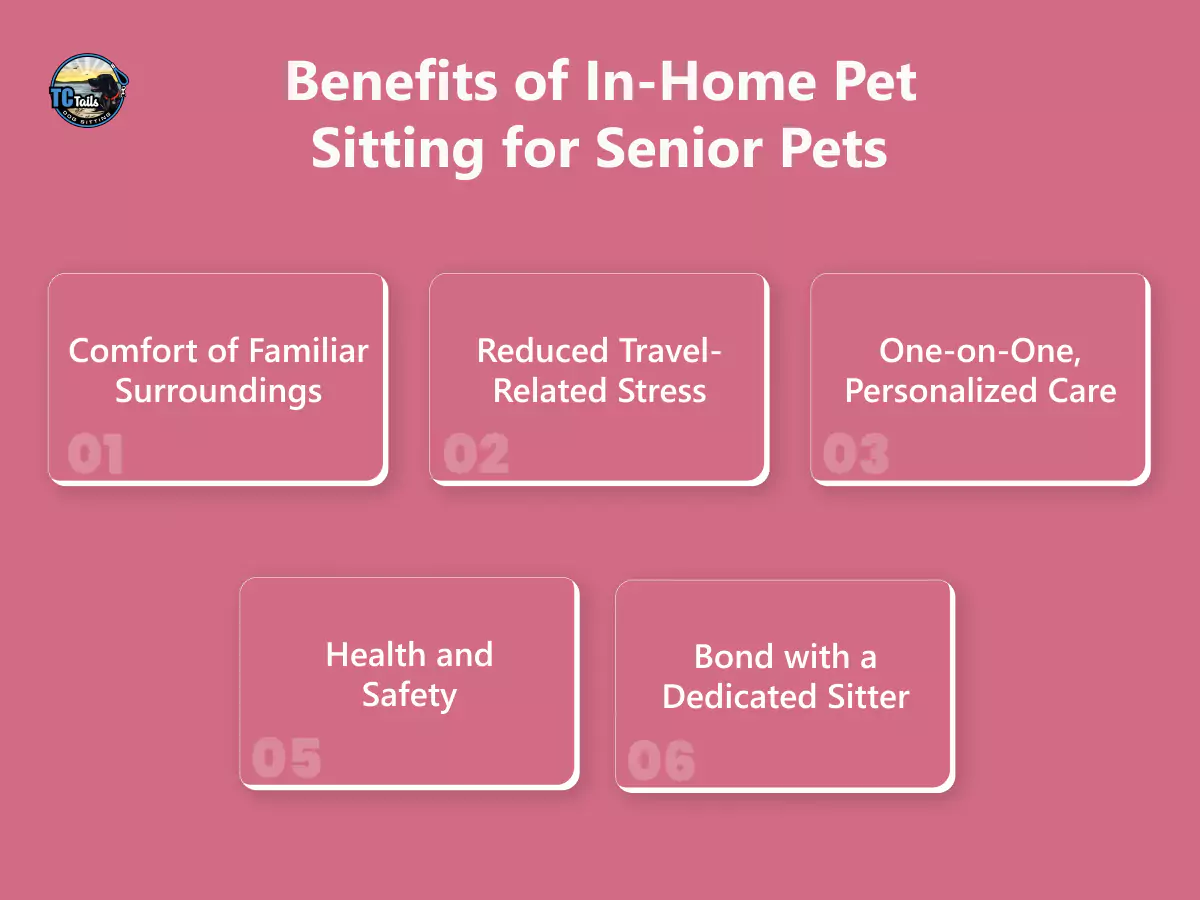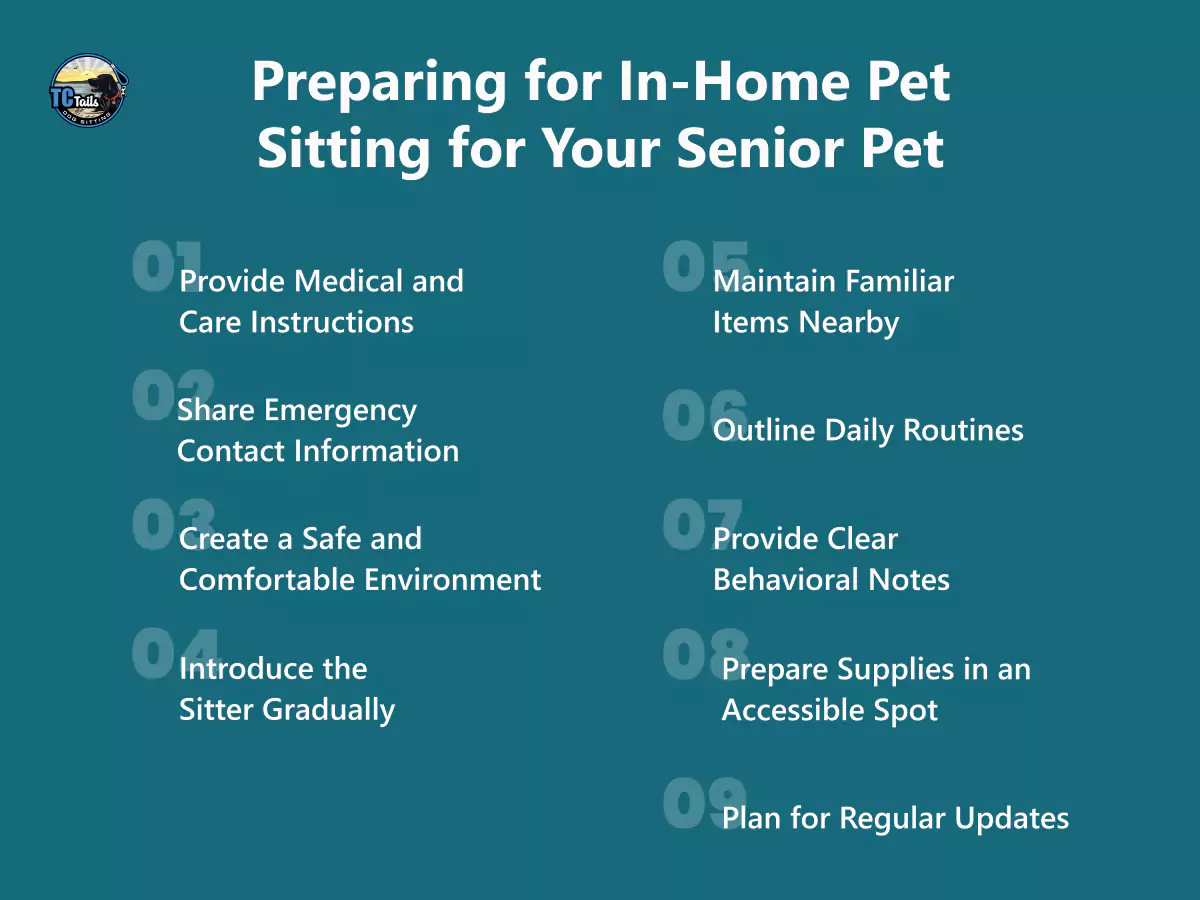Caring for a senior pet comes with unique joys and challenges, especially as they become more sensitive to changes in their environment. In-home pet sitting offers a compassionate solution that allows pets to stay in the comfort of their familiar surroundings, which can be essential for their well-being.
Unlike traditional boarding facilities, in-home pet sitting keeps stress and anxiety at bay—factors that are particularly crucial for older pets who may need a bit more stability and personalized care.
This approach ensures they get the support they need, from medication administration to gentle exercise, making it an ideal choice for pet owners seeking the best care for their aging companions.
Let’s explore why in-home pet sitting is such a valuable option for senior pets and how it can make a real difference in their quality of life.
Read More About Checklist for Your Pet’s Boarding Stay
Understanding Senior Pets’ Needs
Senior pets often face a variety of health challenges that can impact their quality of life. Common conditions include arthritis, decreased energy levels, and declining vision or hearing. These changes can make it difficult for them to adapt to new environments or cope with stressful situations.
A familiar environment can significantly reduce stress and anxiety in older pets. The comfort of their own home, with its familiar smells, sounds, and routines, can help them feel safe and secure. Additionally, in-home pet sitting eliminates the stress associated with travel to and from boarding facilities, which can be particularly taxing for senior pets.
| Have questions or need more information? Contact us now to discuss how our pet sitting services can cater to your furry friend’s needs! |
Benefits of In-Home Pet Sitting for Senior Pets

In-home pet sitting is an ideal solution for senior pets, offering them the comfort and stability they need in a familiar environment. As pets age, they often become more sensitive to change and may require extra attention and care. With in-home pet sitting, older pets receive personalized, one-on-one support that prioritizes their health, safety, and emotional well-being, all within the safe and reassuring surroundings of home.
1. Comfort of Familiar Surroundings
- Reduced Stress and Anxiety: Senior pets often feel more secure in their own space, minimizing the anxiety that can arise from new or unfamiliar places.
- Maintained Routine and Familiarity: Pets can stick to their usual routines, which is comforting for older pets who rely on consistency for a sense of security.
- Familiar Scents and Environment: The familiar smells, sounds, and layout of their home offer comfort, helping senior pets feel safe and relaxed.
2. Reduced Travel-Related Stress
- Avoidance of Transportation Stress: Senior pets, especially those with mobility or health issues, can avoid the physical strain and potential discomfort of travel.
- Minimized Exposure to New Environments: By staying home, senior pets are not exposed to the stress of loud, busy, or unfamiliar places that can overwhelm them.
- Reduced Risk of Motion Sickness: Many older pets may experience motion sickness during travel, which can be entirely avoided with in-home care.
3. One-on-One, Personalized Care
- Customized Feeding, Medication, and Exercise Routines: In-home pet sitters can tailor care to each pet’s specific dietary needs, medical schedule, and energy levels, making adjustments as needed.
- Enhanced Supervision for Early Detection of Health Issues: A dedicated sitter can monitor senior pets closely, noticing early signs of discomfort, illness, or distress that may need prompt attention.
- Attention to Unique Preferences and Needs: Every pet has preferences, and a one-on-one sitter can cater to these—whether it’s a favorite resting spot or a preferred walking pace.
- Specialized Mobility Assistance: For pets with mobility issues, sitters can provide gentle support to help them move comfortably and prevent strain or injuries.
4. Health and Safety
- Monitoring of Age-Related Health Needs: Sitters trained to care for senior pets can regularly check on specific health issues, like arthritis or diabetes, providing extra reassurance for pet owners.
- Access to Emergency Support: In case of an emergency, sitters can quickly reach out for medical support and ensure that the pet receives necessary attention without delay.
- Temperature and Environment Control: Sitters can adjust the home environment, like maintaining a comfortable temperature or reducing noise, to create a safe, relaxing space for senior pets.
- Reduced Exposure to Illnesses: Staying at home lowers the risk of contracting illnesses that are common in boarding facilities, protecting senior pets with weaker immune systems.
5. Bond with a Dedicated Sitter
- Development of Trust and a Strong Relationship: Regular visits from the same sitter allow the pet to build a bond, feeling comfortable and safe around someone they know and trust.
- Consistent Care from a Familiar Sitter: A dedicated sitter provides a reliable and consistent presence, bringing stability and predictability to the senior pet’s routine.
- Personalized Attention and Companionship: For pets who may feel lonely or anxious, having a sitter who provides companionship can greatly improve their mental and emotional well-being.
- Peace of Mind for Pet Owners: Knowing a trusted sitter is caring for their senior pet gives pet owners confidence and reassurance, making in-home pet sitting a comforting choice for everyone involved.
In-home pet sitting offers a wealth of benefits tailored to meet the unique needs of senior pets, providing them with the care, comfort, and consistency they need to enjoy their golden years in peace.
Read More About Guide to Pet Boarding Services – Types, Expectations and Tips
How In-Home Pet Sitting Improves Senior Pets’ Quality of Life
In-home pet sitting can significantly improve the quality of life for senior pets. The emotional benefits include reduced anxiety, enhanced relaxation, and increased contentment. Physically, in-home care provides a safe and controlled environment, allowing for structured exercise and rest. This can lead to better recovery from illness, improved energy levels, and overall better physical health.
What to Look for in an In-Home Pet Sitter for Senior Pets
When choosing an in-home pet sitter for your senior pet, keep these essential qualities in mind to ensure they receive the best care:
- Experience with Senior Pets: Look for a sitter with hands-on experience caring for older pets, as they’ll understand the unique challenges and sensitivities senior animals may face, including changes in mobility, diet, and behavior.
- Ability to Administer Medications: If your pet has specific medical needs, it’s important that the sitter is skilled and comfortable with administering medications accurately and on schedule.
- References and Reviews: Positive testimonials from other pet owners, especially those with senior pets, offer reassurance about the sitter’s reliability, professionalism, and compassion.
- First Aid and Emergency Preparedness: A sitter trained in pet first aid and emergency protocols can respond quickly and effectively in case of sudden health issues or accidents.
- Flexibility for Longer Stays or Frequent Visits: A flexible sitter who can accommodate extended stays or more frequent visits is ideal for senior pets who may need additional attention and care throughout the day.
These qualities ensure your senior pet receives compassionate, attentive, and reliable care, giving you peace of mind while you’re away.
| Ensure your dog’s comfort and happiness while you’re away! Book a stay with TC Tails’ professional pet sitters today! |
Preparing for In-Home Pet Sitting for Your Senior Pet

To ensure a smooth transition and the highest level of care for your senior pet, consider the following preparations:
- Provide Medical and Care Instructions: Clearly communicate your pet’s medical history, medication schedule, dietary needs, and any special care instructions specific to their age or condition.
- Share Emergency Contact Information: Leave your veterinarian’s contact information, along with any emergency protocols, and consider adding the contact of a nearby family member or friend for backup.
- Create a Safe and Comfortable Environment: Pet-proof your home by removing any hazards, and set up cozy bedding, fresh water, and easy access to their favorite spots to keep your senior pet comfortable.
- Introduce the Sitter Gradually: Arrange a meet-and-greet session with the sitter before the actual sitting begins. This allows your pet to become familiar with them, helping to ease anxiety when you’re away.
- Maintain Familiar Items Nearby: Leave out familiar items like toys, blankets, or an unwashed item of your clothing to give your pet a comforting scent they associate with you.
- Outline Daily Routines: Provide a breakdown of your senior pet’s daily routine, including typical feeding times, walks, playtime, and relaxation periods, to ensure their day-to-day schedule remains as stable as possible.
- Provide Clear Behavioral Notes: Inform the sitter of any quirks or sensitivities your senior pet may have, such as anxiety triggers, preferred handling methods, or signs of pain, so they know how to respond appropriately.
- Prepare Supplies in an Accessible Spot: Organize essentials like food, medications, leashes, and grooming supplies in an easy-to-find location, making it convenient for the sitter to care for your pet.
- Plan for Regular Updates: Ask the sitter to provide daily updates, including photos or brief messages, so you’re reassured of your pet’s well-being and can address any questions or concerns promptly.
By taking these steps, you can help your senior pet feel secure and comfortable, ensuring they receive quality care while you’re away.
Read More About Tips for Boarding a Dog with Separation Anxiety
Conclusion
In-home pet sitting offers a compassionate and effective solution for caring for senior pets. By providing a familiar and stress-free environment, personalized care, and close monitoring, in-home sitters can significantly enhance the quality of life for our aging furry companions, helping them stay comfortable and well-cared for in their own space.
For pet owners seeking the best experience for their senior pets, contact TC Tails to learn more about their professional pet boarding services. Let TC Tails provide the trusted, tailored care your pet deserves!
FAQs
What specific training should I look for in a pet sitter for a senior pet?
A good pet sitter for senior pets should ideally have experience in senior pet care, basic pet first aid, and medication administration. Look for sitters who understand age-related conditions like arthritis, cognitive decline, and diabetes, as well as those comfortable with assisting pets with mobility challenges.
How frequently should a pet sitter check on my senior pet?
The frequency can depend on your pet’s specific needs, but typically, senior pets benefit from at least two visits a day or even overnight stays. Discuss your pet’s care requirements with the sitter to create a schedule that works best.
What should I expect from a pet sitter in terms of updates?
Many pet sitters offer daily updates with photos and notes, but you can request updates as frequently as you’d like. This can provide reassurance that your senior pet is comfortable and receiving proper care.
How far in advance should I book an in-home pet sitter for my senior pet?
It’s recommended to book a sitter as early as possible, especially if they’re in high demand or if you have a specific sitter in mind. For holiday seasons or extended stays, booking at least a month in advance is advisable.
What should I do if my senior pet has special dietary needs?
Discuss your pet’s dietary requirements in detail with the sitter and consider providing pre-measured meals to ensure consistency. You may also leave written feeding instructions and contact information for your vet in case questions arise.
Can the sitter help with light grooming or hygiene care for my senior pet?
Some sitters may offer light grooming services, such as brushing or cleaning, and may help with tasks like wiping down after bathroom trips. Discuss these options in advance to ensure they align with your pet’s needs.
